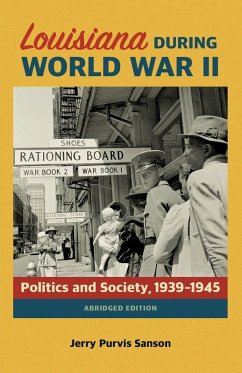While the impact of World War II on America and other countries has been exhaustively chronicled, few historians have investigated the experiences of individual states during the tumultuous war years. In his study of Louisiana's home front from 1939 to 1945, Jerry Purvis Sanson examines changes in politics, education, agriculture, industry, and society that forever altered the Pelican State. The war era was a particularly important time in Louisiana's colorful political history. The gubernatorial victories of prominent anti-Huey Long candidates Sam Jones in 1940 and Jimmie Davis in 1944 reflected shifting sentiments toward politicians and heralded a changing of the guard in the statehouse. This created a system of active dual--faction politics that continued for the next decade. The war also transformed the state's economy: agricultural mechanization accelerated to compensate for labor shortages, and industries increased production to meet military demands. Louisiana's educational system modified its curriculum in response to the war, providing technical training and sponsoring scrap--metal collections and war--stamp sales drives. Sanson explores the war's effect on the everyday lives of Louisianians, showing how their actions at home provided them with a sense of personal participation in the titanic effort against the Axis powers. He also points out that, while many found their lives limited by war, two groups--African Americans and women-- experienced increased opportunities as they moved from low--paying jobs to more lucrative positions vacated by white males who had departed for the service. Now condensed for easy and efficient access, Sanson's historical account provides a wide--ranging yet intimate look at how the war was brought home to the people of the Bayou State.
Hinweis: Dieser Artikel kann nur an eine deutsche Lieferadresse ausgeliefert werden.
Hinweis: Dieser Artikel kann nur an eine deutsche Lieferadresse ausgeliefert werden.








